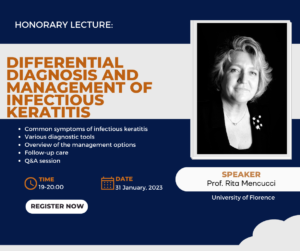
Abstract:
Infectious keratitis is a serious eye infection that can cause vision loss if not treated properly. The purpose of this lecture is to provide an overview of the latest techniques and approaches for identifying and managing this condition.
The lecture will begin with a discussion of the common symptoms of infectious keratitis and the various causes, including bacterial, fungal, and viral infections. Next, the speaker will cover the importance of early diagnosis and the various diagnostic tools and techniques available, such as microbial culture and sensitivity testing, PCR testing and corneal scraping.
The lecture will then focus on the management of infectious keratitis, including appropriate antimicrobial therapy, surgical interventions, and management of complications. The speaker will also discuss the importance of follow-up care and the potential long-term effects of the condition.
The lecture will conclude with a question and answer session, providing attendees with the opportunity to ask questions and discuss specific cases with the speaker.
This lecture is intended for eye care professionals, including ophthalmologists, optometrists, and optometry students, and will provide attendees with valuable information on the latest techniques and approaches for managing infectious keratitis.
Zakaźne zapalenie rogówki jest poważną infekcją oka, która może spowodować utratę wzroku, jeśli nie jest prawidłowo leczona. Celem tego wykładu jest przedstawienie przeglądu najnowszych technik i podejść do identyfikacji i zarządzania tym stanem.
Wykład rozpocznie się od omówienia wspólnych objawów infekcyjnego zapalenia rogówki i różnych przyczyn, w tym infekcji bakteryjnych, grzybiczych i wirusowych. Następnie prelegent omówi znaczenie wczesnej diagnostyki oraz różne dostępne narzędzia i techniki diagnostyczne, takie jak hodowla i badanie wrażliwości drobnoustrojów, badanie PCR oraz skrobanie rogówki.
Wykład skupi się następnie na postępowaniu w infekcyjnym zapaleniu rogówki, w tym na odpowiedniej terapii przeciwbakteryjnej, interwencjach chirurgicznych i postępowaniu w przypadku powikłań. Prelegent omówi również znaczenie opieki follow-up oraz potencjalne długoterminowe skutki schorzenia.
Wykład zakończy się sesją pytań i odpowiedzi, dając uczestnikom możliwość zadawania pytań i omawiania konkretnych przypadków z prelegentem.
Wykład przeznaczony jest dla specjalistów zajmujących się leczeniem chorób oczu, w tym okulistów, optometrystów i studentów optometrii i dostarczy uczestnikom cennych informacji na temat najnowszych technik i podejść do leczenia zakaźnego zapalenia rogówki.


